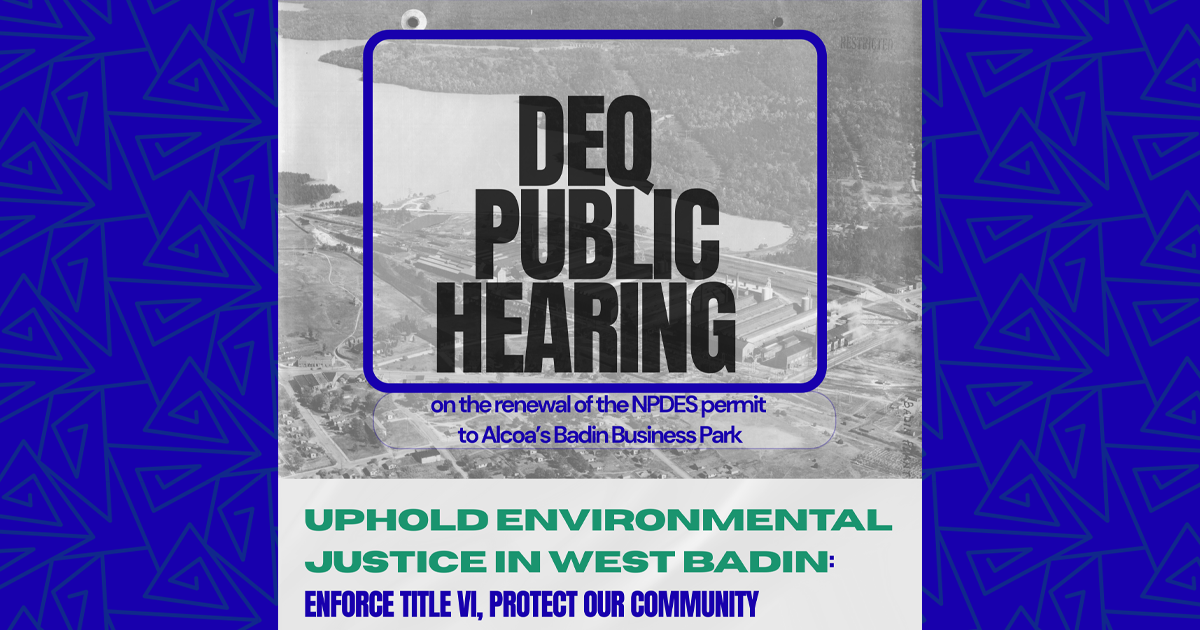On Tuesday August 19th, 2025, a public hearing was held on the renewal of the NPDES permit to Alcoa’s Badin Business Park. Among the 21 speakers, 14 spoke critically of the permit, including The Southern Environmental Law Center, Duke Environmental Law and Policy Clinic, the Yadkin Riverkeeper, North Carolina Conservation Network and others.
Below is a public comment by our friend Jasmine Washington (SELC).
My name is Jasmine Washington and I am a staff attorney at the Southern Environmental Law
Center. We work with the Concerned Citizens of West Badin to address Alcoa’s pollution in Badin.
There are overt, unlawful, attacks on environmental justice (“EJ”). I would like to make clear tonight
that DEQ obligations under Title VI of the Civil Rights Act of 1964 and North Carolina’s Executive
Order 292 have not changed. EPA’s promulgated Title VI regulations prohibit recipients of federal
funding from activities that have the effect of subjecting individuals to discrimination because of
their race, color, national origin, or sex. This is still the law of the land. It cannot be undone by
Executive Order, U.S. Department of Justice guidance or memorandum.
DEQ’s attempts to get ahead of the next attack on EJ from opponents of justice and progress is a
futile exercise. Opponents of justice and progress will attempt to chip away at the rights of
marginalized people, and their efforts to do so are made simple with preemptive compliance.
Instead, DEQ should stand its ground and uphold the law.
Reports, like DEQ’s community profiles, that detail the racial demographics are not unlawful. Due
to recent attacks, these reports and other efforts to advance EJ are more essential than ever. The
law—that is statutes, regulations, and caselaw around Title VI and environmental justice—have not
changed in 2025. Therefore, DEQ must carry through its obligations under Title VI and consider the
disproportionate impacts on communities of color from its permitting decisions.
In this vein, DEQ should be considering cumulative impacts in this permitting action. For nearly 2
decades, members of the West Badin community have spoken out about the harmful practices of
Alcoa in Badin. After decades of segregation and mistreatment in Alcoa’s pothouses, former
employees of Alcoa share openly about the dumping and polluting activities of Alcoa. Instead of
addressing the waste, DEQ has continued to issue Alcoa permits that allow the hazardous waste to
slowly seep into the environment.
West Badin is a prime example of a community burdened by cumulative impacts. Alcoa’s
manufacturing practices created workplace exposure concerns that impact the health of former
workers to this day. Alcoa’s historic dumping of hazardous pollution around the West Badin
community resulted in groundwater and surface water pollution, requiring this permit. On top of
that, Alcoa properties to this day create physical structural barriers that hinder West Badin
community members’ access to the town’s public resources. All together, there exists a
predominately African American community that is bearing a disproportionate burden from a
company’s pollution.
Ultimately, any effort to address water pollution issue with no effort to address Alcoa’s waste or
consider particularized harms is untenable. Instead, all these factors should be considered in this
permitting process.
DEQ should, in compliance with longstanding EPA regulations and directives, consider the
cumulative and disparate impacts in the issuance of Alcoa’s NPDES permit.
I, next, want to acknowledge the efforts that DEQ has made to keep the community informed of
Alcoa’s water permitting activities. However, DEQ misses the mark as it continues to bifurcate the
Alcoa’s hazardous waste from its wastewater.
Instead of notifying the public and seeking input in advance, DEQ and Alcoa have a tendency to
take an action then fill the community in once the decision has been made and action is underway.
Alcoa’s recent demolition of their potrooms, which has resulted in exposed potroom foundation, is
a perfect example of the lack of transparency. Despite quarterly community meetings and
communications with DEQ, community members were not aware of the demolition until they saw
trucks rolling.
Moreover, Alcoa has received over 30 NOVs since the issuance of their 2019 permit (being assessed
less than $17,000 in penalties), but community members would have to dig through pages of
documents on Laserfische to learn of these violations and penalties.
Issues like these are a cause of the community’s distrust of both DEQ and Alcoa.
To address this, DEQ should create a uniform means of providing information to the community
about Alcoa’s operations, including implementing a policy of proactive, cross-programmatic
communications with community members.
Thank you for the opportunity to share these comments tonight. I look forward to your response to
these and other concerns raised.























